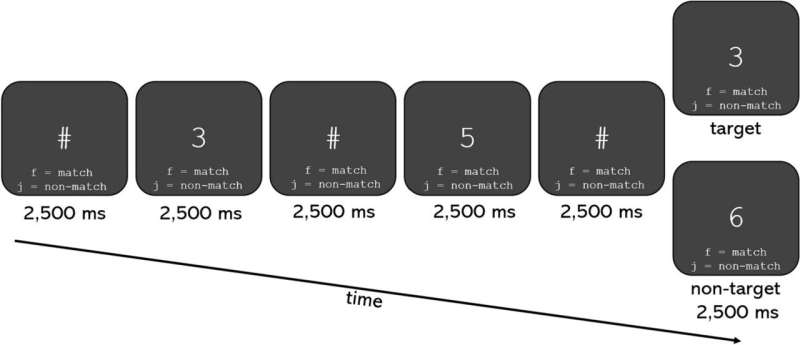This article has been reviewed according to Science X's editorial process and policies. Editors have highlighted the following attributes while ensuring the content's credibility:
fact-checked
trusted source
proofread
Eye-opener: Pupils enlarge when people focus on tasks

Working memory is one of the brain's executive functions, a skill that allows humans to process information without losing track of what they're doing.
In the short term, working memory allows the brain to complete an immediate task, like loading the dishwasher. Long-term, it helps the brain decide what to store for future use, such as whether more dishwasher soap will be needed.
University of Texas at Arlington researchers know that working memory varies greatly among individuals, but they aren't sure exactly why. To better understand, Matthew Robison, assistant professor of psychology, and doctoral student Lauren D. Garner conducted an experiment to see whether studying a person's pupils (the centers of their eyes) was a good indicator of working memory.
Normally, a person's pupils naturally widen (or dilate) in low-light environments to allow more light into the eye. However, in their new study published in Attention, Perception, & Psychophysics, the researchers reported that a person's pupils also dilate when they are concentrating on tasks. In particular, they found that the more a person's eyes dilated during the task, the better they did on tests measuring their working memory.
"What we found was that the lowest performers on the tasks showed less pupil dilation," Robison said. "For the highest-performing participants, their pupil dilations were both larger overall and the individuals were more discerning about the information they were asked to recall."
For the study, he and Garner recruited 179 undergraduate students at UT Arlington. Participants completed several working memory tasks where they were presented with information and then asked to remember it for a few seconds. During the tasks, participants had their pupils continuously measured using an eye-tracker, similar to what optometrists use during eye exams.
"We found that people who more intensely and consistently paid attention, as measured by their pupils being dilated more, performed better on the memory tasks," said Robison. "Importantly, we found high performers also showed more pupil sensitivity compared to low-performing participants. This is exciting research because it adds another valuable piece of the puzzle to our understanding of why working memory varies between individuals."
More information: Matthew K. Robison et al, Pupillary correlates of individual differences in n-back task performance, Attention, Perception, & Psychophysics (2024). DOI: 10.3758/s13414-024-02853-2




















